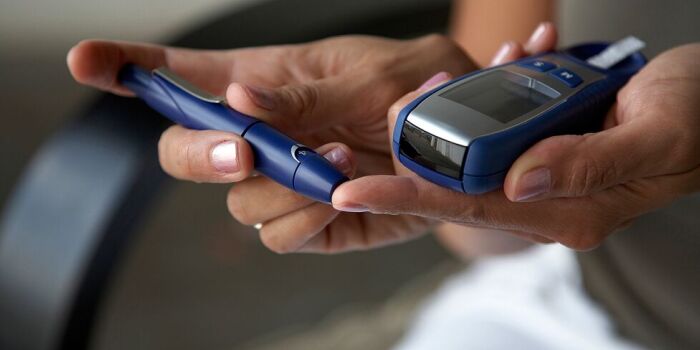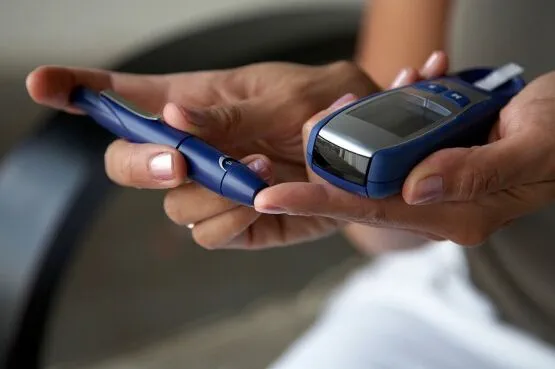What is prediabetes?
Type 2 diabetes is a well-known health condition that needs careful management. But managing prediabetes is just as important. Early detection and treatment can prevent you from getting type 2 diabetes. Here, I’ll address the causes, symptoms, and treatment of this common metabolic disorder.

What is the test for prediabetes?
The usual test for prediabetes measures your HbA1c levels. HbA1c is a measure of how much sugar has attached to the haemoglobin within your red blood cells. This is called glycated haemoglobin. A HbA1c test shows your average blood glucose levels over the last couple of months.
An HbA1c test is recommended if you:
- are over 40 (or over 25 years if you’re African-Caribbean, Black African, South Asian or Chinese)
- have a history of gestational diabetes
- have polycystic ovary syndrome (PCOS)
- have a parent with type 2 diabetes
How is prediabetes different to Type 2 diabetes?
The difference between prediabetes and type 2 diabetes is your blood sugar (glucose) levels. With prediabetes your blood glucose levels will be higher than normal, but not yet in the category for type 2 diabetes.
- For prediabetes your HbA1c will be between 42mmol/mol – 47mmol/mol
- In type 2 diabetes your HbA1c levels will be 48 mmol/mol or higher
A healthy HbA1c level is below 42 mmol/mol.
How long does it take prediabetes to turn into type 2 diabetes?
The time it takes for prediabetes to become type 2 diabetes will vary between people. Without treatment it can occur within 5 years, but depends on factors such as:
- age
- genetics
- health issues
- lifestyle choices
The good news is, you can take steps to prevent type 2 diabetes if your blood sugar levels are in the prediabetes range.
What are the warning signs of prediabetes?
Unlike type 2 diabetes, there are usually no symptoms of prediabetes. This is why it often goes undetected - about 1 in 5 people in the UK have prediabetes. Many people have it without realising.
However, there are symptoms of type 2 diabetes, so if you have any of the following, see a doctor for more advice:
- feeling thirstier than usual
- peeing more than normal, especially at night
- feeling tired
- losing weight without trying
- blurry vision
What changes should you make if you’re prediabetic?
There is lots you can do to reduce your blood sugar levels to a healthier range. Raised blood sugar levels are often the result of your lifestyle, which means you have a lot of power to improve your health.
1) Reduce your carbohydrate intake
Many of us eat more carbohydrates than we need – which can lead to both obesity and raised blood sugar levels. Try to keep your carb intake to a quarter of your plate.
2) Change the type of carbohydrates you consume
Remove refined carbohydrates from your diet and replace them with complex carbohydrates. So, choose granary bread, jumbo oats, and brown pasta instead of white flour products. Complex carbohydrates are higher in fibre which means sugar is released more slowly. This can improve your blood sugar levels over time.
3) Reduce your added sugar intake
Added sugar sneaks into many foods and drinks including juices, condiments and yoghurts. So always check the labels for sources of sugar and aim to consume drinks with under 5g sugar per 100ml. Ideally make water your drink of choice.
4) Move more
Exercise can use up excess blood sugar so try to move as often as you can. Just 30 minutes of daily walking can halve your risk of developing type 2 diabetes. Resistance exercise such as weightlifting and squats have also been shown to lower blood glucose.
5) Reduce stress and sleep well
Both high stress levels and poor sleep can raise your blood sugar levels. The following may help:
- sleep and wake at the same time every day
- avoid alcohol and heavy meals before bed
- try to get morning light exposure
- take time out to rest and relax
- try mind-body exercises such as yoga
6) Lose excess weight
If you are overweight, losing excess weight can improve your blood sugar levels. Cutting down your calories by 500 to 600 calories per day may help you to lose weight in a sustainable way.
7) Improve your gut health
There is evidence to suggest that improving your gut microbiome (the number and variety of helpful gut bugs living in your large intestine) can improve your blood sugar levels. To do this:
- eat lots of fibre rich foods such as vegetables, pulses, nuts, seeds and wholegrains
- increase your intake of pre and probiotic foods such as asparagus, garlic, oats, live yoghurts and kimchi
- eat a diverse diet with a wide range of colourful plant-based foods
Can you reverse prediabetes?
Yes – prediabetes can be reversed through lifestyle changes. This means you can avoid developing type 2 diabetes and its health risks. You will need to stick to the changes you make, and to check that your blood sugar levels are in a healthier range.
Even if you have already been diagnosed with type 2 diabetes, you can put the condition into remission if you strictly follow healthy changes. But prevention is always best.
Are you interested in learning more about your health? Discover more about our range of health assessments.
-
Sources Sources
- Prediabetes symptoms and risk reduction. Diabetes UK. Diabetes.org.uk, accessed August 2025.
- One in five adults now live with diabetes or prediabetes in the UK. Diabetes UK. Diabetes.org.uk, accessed August 2025.
- What us HbA1C? Diabetes UK. Diabetes.org.uk, accessed August 2025.
- About prediabetes and type 2 diabetes.
- Type 2 diabetes symptoms. Diabetes UK. Diabetes.org.uk, accessed August 2025.
- Type 2 diabetes risk factors. Diabetes UK. Diabetes.org.uk, accessed August 2025.
- How bad are sugary drinks for your health? British Heart Foundation. Bhf.org.uk, accessed August 2025.
- Stress and diabetes – the impact on your wellbeing. Diabetes UK. Diabetes.org.uk, accessed August 2025.
- Sleep and diabetes. Diabetes UK. Diabetes.org.uk, accessed August 2025.
- Does exercise lower blood sugar levels? Diabetes UK. Diabetes.org.uk, accessed August 2025.
- Brown E, Barry A. Franklin J, et al. Effects of single bout resistance exercise on glucose levels, insulin action, and cardiovascular risk in type 2 diabetes: A narrative review. Journal of Diabetes and its Complications. 2020; 34: 8.https://doi.org/10.1016/j.jdiacomp.2020.107610
- Sletten T, Weaver M, Foster G, et al. The importance of sleep regularity: a consensus statement of the national sleep foundation sleep timing and variability panel. Journal of the national sleep foundation. 2023; 9:6.
- Iao SI, Jansen E, Shedden K, et al. Associations between bedtime eating or drinking, sleep duration and wake after sleep onset: findings from the American time use survey. Br J Nutr. 2021;127(12):1-10. doi: 10.1017/S0007114521003597
- He M, Ru T, Li S, et al. Shine light on sleep: Morning bright light improves nocturnal sleep and next morning alertness among college students. J Sleep Res. 2023; 32(2):e13724. doi: 10.1111/jsr.13724.
- Yoga and how it can benefit you. British heart foundation. Bhf.org.uk, accessed August 2025.
- Weight loss and diabetes. Diabetes UK. Diabetes.org.uk, accessed August 2025.
- Sadagopan A, Mahmoud A, Begg M, et al. Understanding the Role of the Gut Microbiome in Diabetes and Therapeutics Targeting Leaky Gut: A Systematic Review. Cureus. 2023;15(7):e41559. doi: 10.7759/cureus.41559.
- Yao B, Fang H, Xu W, et al. Dietary fiber intake and risk of type 2 diabetes: a dose-response analysis of prospective studies. Eur J Epidemiol. 2014;29(2):79-88. doi: 10.1007/s10654-013-9876-x.
- Hamasaki H. Daily physical activity and type 2 diabetes: A review. World J Diabetes. 2016;7(12):243-51. doi: 10.4239/wjd.v7.i12.243
About our health information
At Bupa we produce a wealth of free health information for you and your family. This is because we believe that trustworthy information is essential in helping you make better decisions about your health and wellbeing.
Our information has been awarded the PIF TICK for trustworthy health information. It also follows the principles of the The Information Standard.

More general health advice articles
Did you find our advice helpful?
We’d love to hear what you think. Our short survey takes just a few minutes to complete and helps us to keep improving our healthy lifestyle articles.
Legal disclaimer
This information was published by Bupa's Health Content Team and is based on reputable sources of medical evidence. It has been reviewed by appropriate medical or clinical professionals and deemed accurate on the date of review. Photos are only for illustrative purposes and do not reflect every presentation of a condition.
Any information about a treatment or procedure is generic, and does not necessarily describe that treatment or procedure as delivered by Bupa or its associated providers.
The information contained on this page and in any third party websites referred to on this page is not intended nor implied to be a substitute for professional medical advice nor is it intended to be for medical diagnosis or treatment. Third party websites are not owned or controlled by Bupa and any individual may be able to access and post messages on them. Bupa is not responsible for the content or availability of these third party websites. We do not accept advertising on this page.





